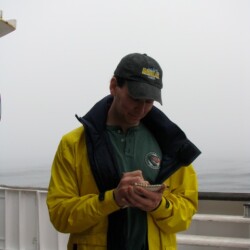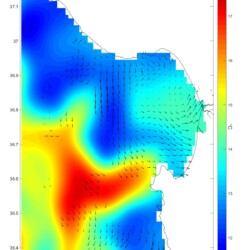Physical Factors Influencing Phytoplankton Abundance in Southern Monterey Bay
A Thesis Defense by C. Ryan Manzer
Tuesday, December 12th, 2017 at 4pm
MLML Seminar Room
Thesis Abstract:
As the base of almost all marine food webs, phytoplankton play a dominant role in determining the productivity of marine ecosystems. Recent studies have highlighted the dynamic variability of phytoplankton abundance in nearshore ecosystems over synoptic time scales. The inability of satellite ocean color monitoring to resolve chlorophyll values at a resolution less than 1 km and a reliable temporal resolution of ~8 days means this data cannot adequately capture the impact of nearshore dynamics on chlorophyll abundance and distribution. Therefore, a greater understanding of the physical mechanisms that contribute to this variability is required to assess impacts of current as well as future weather patterns on these ecosystems. In this study, chlorophyll fluorescence data from a nearshore location in the south Monterey Bay is used to identify the timing and duration of increases in phytoplankton concentrations. Physical parameters, including wind stress and water temperature were analyzed to determine whether upwelling and/or upwelling relaxation events correlate with observed blooms. A significant negative correlation between water temperature and chlorophyll was found for the two summer seasons studied (2012, 2013) which suggess that increases in chlorophyll concentrations are more likely due to advection than biological reproduction. The results of this study suggest that phytoplankton are advected into the southern Monterey Bay during wind relaxation events of great enough magnitude to disrupt dominant circulation patterns. These impacts are site specific and demonstrate the degree to which the ecological subsidies can vary over small spatial ranges at synoptic scales.



